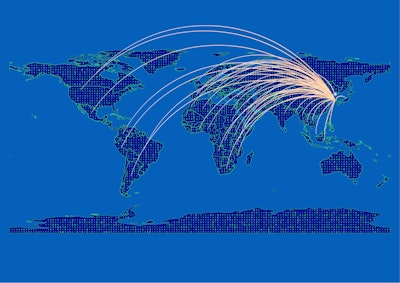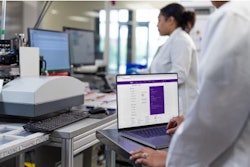
With the increasing digitalization of the supply chain and increased cargo theft and fraud within the industry, cybersecurity has become paramount. As third-party logistics (3PL) companies continue to have intricate operations, they face a heightened risk of cyber threats. In order for companies to maintain robust security, the transportation industry must take consistent, proactive and long-term measures on multiple fronts to combat ongoing cyber threats.
Increase of Fraud Across the Board
The transportation industry has seen a significant rise in fraudulent activities, particularly following the onset of the COVID-19 pandemic. With many employees transitioning to remote work, cybercriminals have exploited vulnerabilities in remote session protocols. The increase in digital transactions and the complexity of supply chain networks have also contributed to the surge in fraud. Cybercriminals target weak links in the supply chain to disrupt operations, steal data, and demand ransoms, making robust cybersecurity measures more critical than ever.
Among the various cyber threats, end-user error, particularly through phishing attacks, remains the most significant risk above the rest. Phishing involves deceptive emails designed to trick recipients into disclosing sensitive information or installing malware. Despite advanced security technologies, human error continues to be a major vulnerability. Continuous security awareness training and multi-layered security protocols are essential to mitigate this risk.
Proactive Security Measures
To stay ahead of cyber threats, 3PL companies can establish a Security Operations Center (SOC) integrated with artificial intelligence (AI). A SOC monitors and analyzes security incidents in real-time, while AI enhances threat detection and response capabilities. This proactive approach allows companies to identify and neutralize threats before they can cause significant damage. The use of AI in SOCs enables continuous learning and adaptation to new threats, ensuring robust ongoing protection. However, the cost of creating a SOC could be a deterrent for some companies. One alternative would be to partner with a company that offers Managed Detection and Response (MDR) capabilities.
Security Information and Event Management (SIEM) systems are also crucial for modern cybersecurity strategies. SIEM aggregates and analyzes log data from various sources, including servers, network devices, and applications. By providing real-time insights and alerts, SIEM helps companies detect and respond to security incidents swiftly. It also ensures that logs are securely stored offsite, preventing tampering by malicious actors. Normally, malicious actors would attempt to delete those logs but with the right technology, that information is pushed off site, where it can never be deleted or manipulated. This technology allows companies to address threats as they emerge in real-time.
Employee training remains a cornerstone of effective cybersecurity. Regular training sessions help employees recognize and avoid phishing attempts and other social engineering tactics. Many platforms offer comprehensive security awareness programs that include phishing simulations and educational materials. Automated testing and personalized training plans ensure that employees stay vigilant and informed, significantly reducing the risk of human error.
Importance of Business Continuity and Disaster Recovery Plan
A robust business continuity and disaster recovery plan is essential for minimizing the impact of cyber-attacks. Such plans ensure that companies can quickly restore operations and data in the event of a breach. Immutable backups, which cannot be altered or deleted, provide a reliable fallback. Investing in technologies, such as AI and multi-factor authentication and upgrading security frameworks regularly, can bolster a company's defenses against cyber threats. Additionally, cloud-based recovery solutions enable rapid restoration of services, reducing downtime from days to hours. These measures ensure that businesses can maintain operations and protect their reputation even in the face of cyber incidents.
Protecting customer data is a top priority for 3PL companies. Adhering to industry best practices, such as using the latest Transport Layer Security (TLS) protocols, ensures secure data transmission. Regular vulnerability scans and web application assessments help identify and address potential weaknesses. Collaboration with a cybersecurity consulting firm helps establish a pathway to a security Framework, such as the National Institute of Standards and Technology (NIST) or the International Organization for Standardization (ISO) 27001 and provides teams (especially smaller IT/Cybersecurity teams) with ongoing guidance, insights, and recommendations, ensuring that data protection measures evolve with emerging threats.
The Need for Cyber Insurance
Cyber insurance is increasingly vital for 3PL companies. As cyber threats grow in frequency and sophistication, having a safety net is essential. Cyber insurance helps cover the financial losses associated with data breaches, ransomware attacks, and other cyber incidents. It also provides access to expert resources for incident response and recovery. Given the high stakes, cyber insurance is no longer optional but a critical component of a comprehensive cybersecurity strategy.
This increase of attacks on supply chain companies is the new normal that we’ll be living in moving forward. Companies need to acquire cyber insurance and be in a mindset of “not if, but when” for cyber threats and be on guard at all times.
The Advancement of Ransomware and AI’s Role
Ransomware has evolved beyond targeting individual devices to attacking server hosts and virtual environments. These sophisticated attacks can simultaneously compromise multiple systems, causing widespread disruption. AI plays a dual role in this landscape: while it is used by cybercriminals to automate and enhance attacks, it also empowers defenders by enabling advanced threat detection and response. AI-driven security tools can identify and neutralize ransomware threats more effectively, reducing the potential impact on businesses.
Despite the clear need for robust cybersecurity, the transportation industry has been slow to adopt advanced security measures. This reluctance often stems from budget constraints and a lack of awareness about the severity of cyber threats. However, the saying "if you can't afford the security, you can't afford the ransomware" holds true. Investing in cybersecurity is not just a protective measure but a necessary step to safeguard against potentially crippling financial and operational damage for companies later on. That’s why partnering with a 3PL that has extensive cybersecurity measures set in place is vital for a company’s supply chain.
Cybersecurity is no longer a secondary concern for transportation companies; it is a critical component of their operational integrity and customer trust. By understanding the risks, implementing advanced security measures and fostering a culture of continuous improvement and vigilance, companies can protect themselves against the growing tide of cyber threats. As the industry evolves, staying ahead of cybercriminals will require ongoing investment in technology, training and strategic planning from all.




















